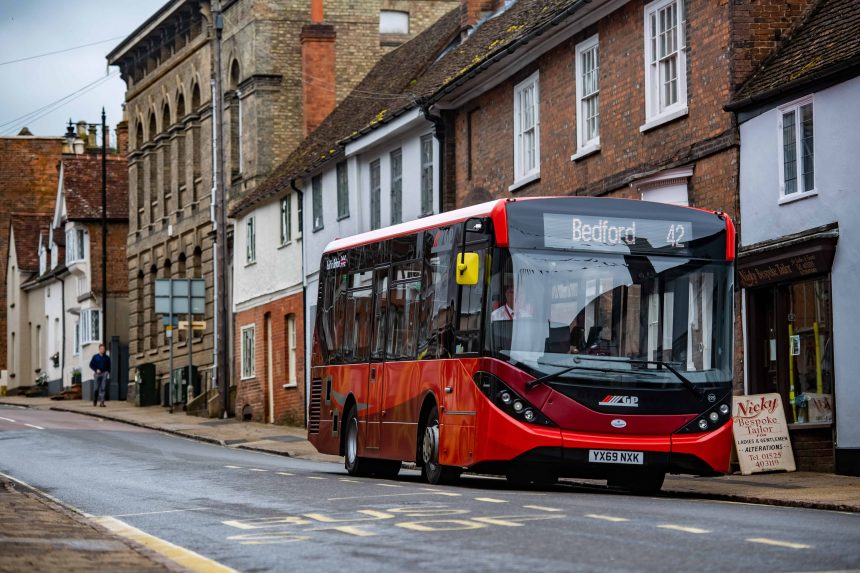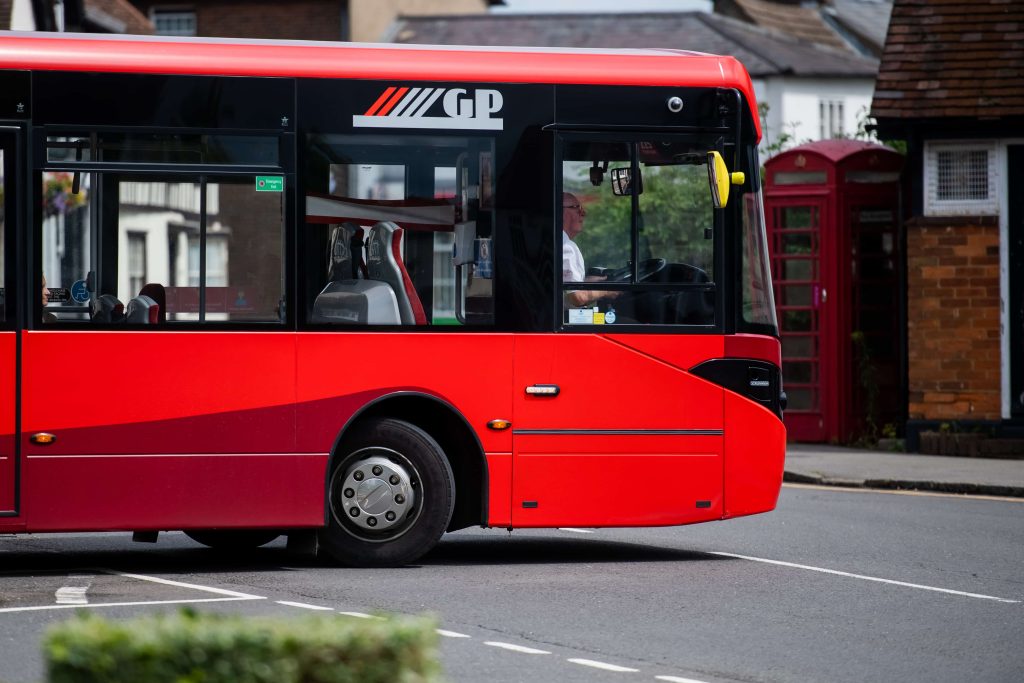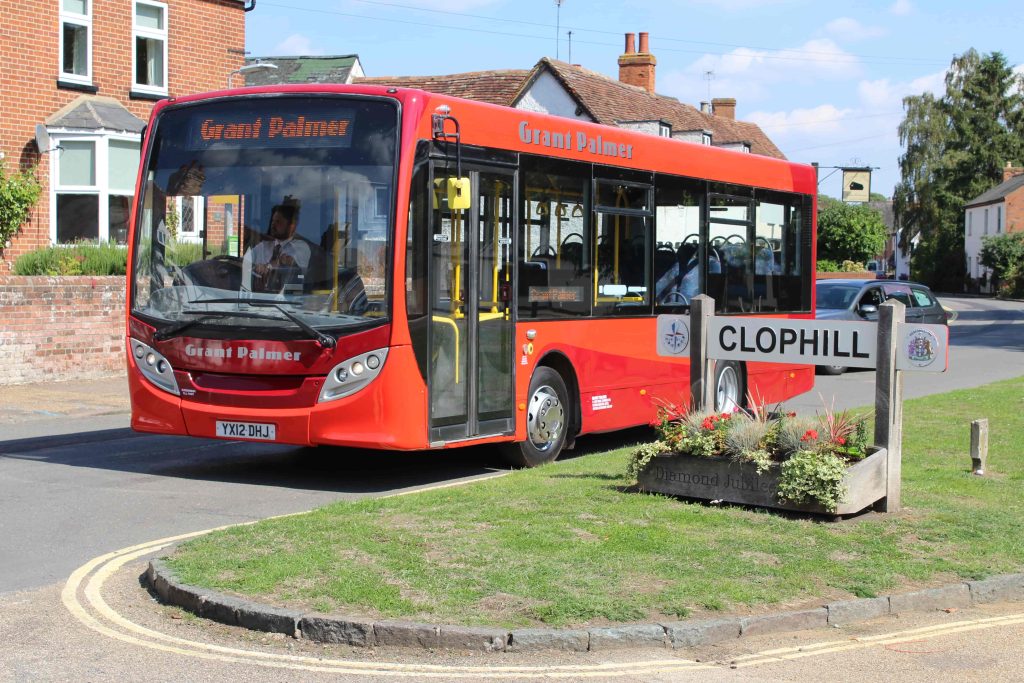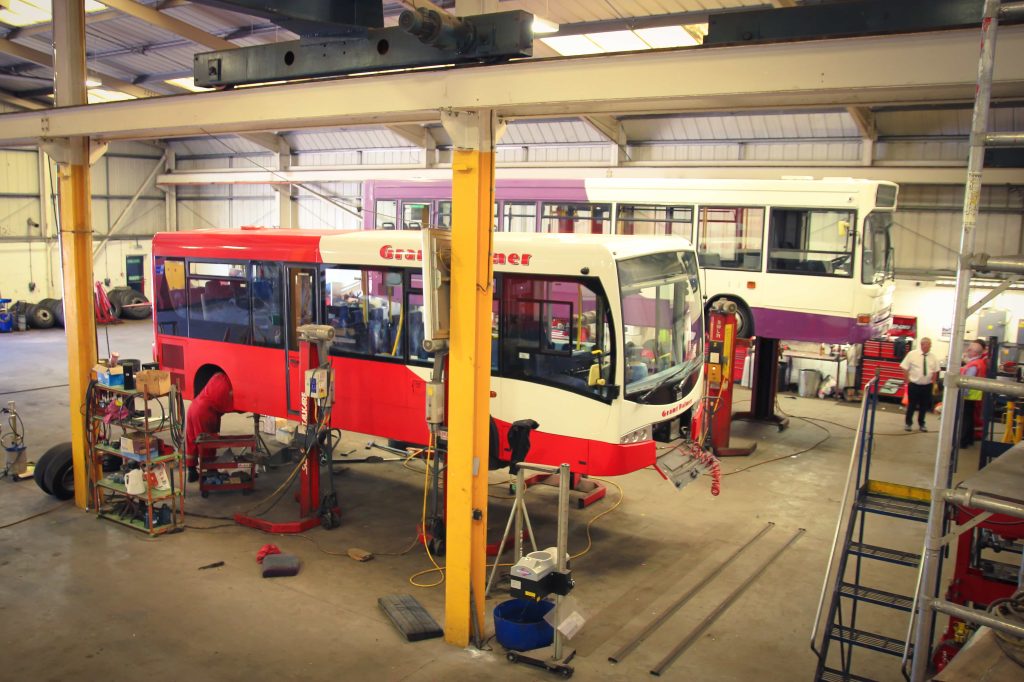Last year, independent bus operator Grant Palmer celebrated its 25th anniversary. The company made headlines after it grew its presence in Bedfordshire, with new services launched between Biggleswade, Luton and Milton Keynes. These services provided some of the first through links to Bedford for the first time in several years. It did so after the withdrawal from several incumbents. Each time, Grant Palmer has stepped in — sometimes on a commercial basis, sometimes with the local authority — and integrated its new routes into a network to establish efficiencies and build a service attractive to passengers. It bought a plot of land off the A1 as an outstation, adding five buses and seven drivers, which has helped with service delivery recruitment.
The company now has a fleet total of 40 vehicles with some 60 permanent drivers. Flexibility and pragmatism is key to the success stories above. routeone paid the operator a visit to reflect on recent work, and how an independent plans to equip itself for the future challenges facing the bus sector.
The challenge
Amid a turbulent economic and regulatory landscape, attracting passengers is the operator’s strategy for 2025. It is a solid approach; an anticipation of tighter local authority funding and tighter spending habits among the general public is prompting a desire to attract a demographic of customer that chooses the bus for a good value fare. That makes 2025 the year that Grant Palmer focuses on its product, marketing schemes for new routes which include a promotional film, and a “refinement” of its existing offerings.
David Shelley, Director of Grant Palmer, says the big challenge for achieving that customer growth now stems from ensuring bus travel remains a value-for-money proposition. He draws attention to rail travel — particularly the sentiment of egregious pricing on season tickets — and warns bus travel risks being perceived in the same way if the industry doesn’t keep tabs.
“We have horrendous cross pressures as an industry,” he explains. “We’re impacted by National Insurance contributions increases, minimum wage changes, and there are other regulatory changes and cost pressures that are going to impact us. Our suppliers also have cost pressures; new buses are on average 10% more expensive, and who knows what will happen to fuel. Where we have failed as an industry over the last 20 years is that we have under recognised the impact of price increases on our customers. Higher fares have led to a drop off in patronage across the whole of the industry.”
While Transport for London’s model is often lauded as a success for patronage — patronage growth was highlighted as a success amid the first anniversary of its Superloop services in 2024 — David observes that that success may be more down to fare structure than style of provision. “What we want to do is try and replicate that, and squeeze as much value for money for our customers as we can,” he adds. “It’s going to be difficult. We have to compete in the same market, but I want people to see our bus network in Bedford as being good value… and lots of that is down to perception. 25 years ago, I sat in a focus group with some bus customers, one of whom said season ticket prices were too expensive. When asked what a fair price would be, they suggested £10. Our prices were lower than that, at £8 — that was a communication issue.”
A year of growth
Opportunities abound in Grant Palmer’s region, and it is keen to exploit them. The company exists in an area of significant commercial and residential development with one of the biggest arrivals to the area the announcement of Universal Studios’ Universal UK Project, a planned theme park to cover two square kilometres near Bedford. The operator sees that being transformational, along with opportunities from East West Rail, a new railway planned to connect communities between Oxford and Cambridge. Leveraging those adds on much already done, including a refreshed look for Bedford park-and-ride, and net changes in the network to reflect new travel patterns.
In the short term, housing and warehouse developments present more ripe potential. At the time of routeone’s visit, David and Grant Palmer Commercial Manager Thomas Manship were due to attend a meeting with a developer in Houghton Regis to discuss a new service that could serve as a sibling to its existing Hi route, which runs from Luton to Houghton Regis. Both are particularly proud of the precedent for that.
Hi, which started with Section 106 funding from the Houghton Regis North (HRN) Urban Extension, came after Grant Palmer recognised a “gap in the market”. HRN2, which will include up to 1,850 homes, primary schools and local retail and community centres, is also in development, though has been slower in getting services off the ground. Despite that, the company has been proactive in pursuing an hourly service there, to be operated commercially under the name Jo — at least until efforts to work with the developer bear fruit.
Pragmatism and flexibility
This speaks of Grant Palmer as a paragon of the flexibility that can be had with a smaller independent way of working. It plays to its strengths by making the most of relationships with local authorities, particularly Central Bedfordshire Council, and promotes the benefits of “pragmatic discussions” about what it can do, and how it can do it. Bus Service Improvement Plan funding played an important role in reinstating services, highlighting the importance of those relationships. That is all tied together by a reputation for excellent service delivery.
“We do try to portray ourselves as a good quality operator,” says David. “I wouldn’t describe ourselves as a low-cost operator, but we are efficient, and our overall operational costs are less than larger competitors. That means we can make a go of routes which larger companies might struggle with. We have a core commercial offering on our services with modern buses equipped with the latest equipment, and the fact that other operators have withdrawn from the region has given us a sizeable cake to make the best of.”
In 2015 Grant Palmer introduced a policy as a company to buy two new buses a year. That policy was followed through COVID-19, and only in 2024 did it break, and the first vehicle order cancelled. That came off the back of uncertainty around the future of the industry. When an investment has a 15-year lifespan, no-one can blame a company for wanting some degree of stability.
That primarily comes from the lack of a clearly laid plan around franchising in the region. At time of writing, the operator already works closely with those authorities with Enhanced Partnerships in place, but there are mixed political voices within each authority about the future direction. There has been no clear statement in Bedfordshire, but David warns that “political will changes very quickly” — noting that Central Bedfordshire, until recently, was a true Conservative local authority. It is now independent. Bedford Borough Council meanwhile has been a Liberal Democrat authority for years but fell under the yoke of a Conservative Mayor around two years ago. Even where a clear policy is decided, there is the risk of change.
Legislatively, David recognises that it matters little what an incumbent administration says. A future one may think differently. But the “genie has been let out of the bottle” for smaller business. “We wouldn’t be able to move buses around, and clearly if franchising becomes the norm across the country, or new contracts come in that require new vehicle specifications like in Manchester, we could see an impact on our asset values — London has had equipment for years that suppresses second-hand asset value.”
In that case, nothing short of a binding agreement that franchising won’t happen would allow for worry-free investing.
“We’re still nervous about capital investment in long-term depreciating assets,” David adds. “We don’t really know where [the future of the industry] is going and it does impact on investment decisions.
“The money we spend is effectively our own. We have invested a lot in the last five years — apart from buses, we have invested in electronic equipment with ticketing, tap on, tap off, improved CCTV, and the Lytx dash camera management system. We have now started to roll out investment in our passenger information system to meet statutory requirements. We have upgraded our premises; our workshop where we do all of our maintenance is IRTEC-accredited. There is plenty of investment going on — and because we have invested so much in recent years, that means we can take a bit of a breather.”
Any business faces a balance between risk and reward. For Grant Palmer, changes to the political landscape have simply increased the risk. The consequence is to reduce its exposure to the market. “The decisions we take factor in that higher level of risk,” David says. “Where we might have taken three new buses, we now might take only one or two. We can do things to strengthen our business; invest in our staff, recruit and train the best we can to get all roles, and we will continue to invest in our fleet. But the extent of that investment is reduced. Last year we were considering buying new double-deckers. Now, I’m not sure whether we will. Those are the outcomes.”
But that does not impact the operator’s ability to offer a good service to passengers, or its ability to grow patronage and revenue. Would such consequences, the ageing of a fleet by two or three years, be something Grant Palmer’s customers notice? Probably not. It is already seeing local authorities in difficult financial positions reducing age and emissions standards within their contracts so as to ease the burden of supply; Grant Palmer moderating its own fleet will keep it competitive. “It’s unfortunate,” David acknowledges, “because the modern fleet we and others operate has improved people’s perception of public transport. But overall, we can still be proud of the network we run.
“What I do worry about is the combined impact on the economy. That could be significant. If we reduce our vehicle orders by half — what is the impact on the manufacturers?”
Beyond that, the company is seeing the benefit of frequency improvement (most notable on the Hi service, with a 60-70% rise between 2023 and 2024) after a torrid period following COVID-19, and will watch closely the situation with fares. A simple fare structure in the region is credited with driving passenger growth, and Grant Palmer is trying hard to maintain that scheme. Congestion remains a perennial issue, as well as reduction in bus priority — frustrating, given the demonstrable local benefits of the Luton Guided Busway.
David remains optimistic, and hopes that the overall strategy of targeting passenger growth could deliver a 10% rise on its core networks, with more on services such as Hi. It won’t be easy, but Grant Palmer does not shy away from a challenge.






























